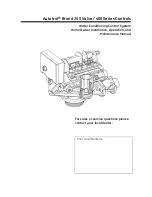
15
General
Periodically the drain valve should be opened and the water
allowed to run until it flows clean. This will help to prevent
sediment buildup in the tank bottom.
Periodically check the temperature and pressure relief valve
to ensure that it is in operating condition. Lift the lever at the
top of the valve several times until the valve seats properly
and operates freely.
Water heater maintenance includes periodic tank flushing and
cleaning, and removal of lime scale from the heating element.
The heater tank is equipped with an anode rod to aid in
corrosion control.
anode rod InspectIon
The anode rod is used to protect the tank from corrosion. Most hot
water tanks are equipped with an anode rod. The submerged rod
sacrifices itself to protect the tank. Instead of corroding tank, water
ions attack and eat away the anode rod. This does not affect water’s
taste or color. The rod must be maintained to keep tank in operating
condition.
Anode deterioration depends on water conductivity, not necessarily
water condition. A corroded or pitted anode rod indicates high water
conductivity and should be checked and/or replaced more often than
an anode rod that appears to be intact. Replacement of a depleted
anode rod can extend the life of your water heater. Inspection should
be conducted by a qualified technician, and at a minimum should be
checked annually after the warranty period.
Artificially softened water is exceedingly corrosive because the
process substitutes sodium ions for magnesium and calcium ions.
The use of a water softener may decrease the life of the water
heater tank.
The anode rod should be inspected after a maximum of three years
and annually thereafter until the condition of the anode rod dictates
its replacement.
NOTE: Artificially softened water requires the anode rod to be
inspected annually.
MaIntenance
Summary of Contents for DEL-6
Page 19: ...19 nOTES ...










































